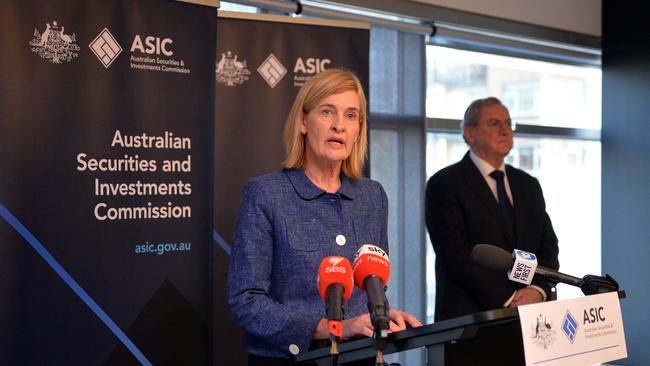AustralianSuper is set to cop a $27m fine after allegations of ‘extremely serious conduct’
Superannuation members with multiple accounts tend to be the least well off and work multiple jobs, a court has heard as the country’s biggest superannuation scheme is set to pay a record fine over its alleged conduct.

Business
Don't miss out on the headlines from Business. Followed categories will be added to My News.
The country’s biggest super fund is set to cop a fine worth about $27m, after accepting “systemic failings” led to it allowing 90,000 people to be charged multiple sets of fees for duplicate accounts that resulted in members being $69m out of pocket.
Australian Super, which has agreed to the proposed penalty and co-operated with the corporate cop, was criticised by Federal Court judge Lisa Hespe who said excuses that compliance is “too hard” or “not interesting” won’t fly.
“The conduct is extremely serious,” she said.
The Australian Securities and Investments Commission is suing Australian Super over claims it failed to identify members who held multiple AustralianSuper accounts and to merge those accounts, despite knowing about the problem since at least 2018.
ASIC claimed the super giant charged multiple sets of fees and insurance premiums to about 90,000 members between July 1 2013 and March 31 2023, with the total cost to members being about $69m.

New rules were introduced in 2013, requiring superannuation trustees to put in place their own procedures defining when and how multiple nest egg accounts must be merged. The change was effective from July that year.
In an extraordinary 2015 exchange, Australian Super senior management accountant Tim Cheney told a service improvement analyst: “it benefits the member by stopping the $1.50 charge on their (duplicate account)”.
“But for us it means less revenue,” the court heard.
“Don’t see what benefit it has for us other than goodwill to the member and so we don’t lose them to the ATO if the account is inactive and small.”
For ASIC, barrister Tim Begbie KC urged Justice Hespe to send a message to the superannuation industry and business more broadly that “this type of inattention to compliance” is not acceptable.
“Proper function of the superannuation (industry) is an absolute pillar of a functioning financial system in Australia,” he said.
“This was not a small under resourced business that could not have done more than it did. This was an entity with . no excuse for under resourcing.”
ASIC acknowledged Australian Super remedied the situation, paid back all the money to members and co-operated with the regulator.
But Justice Hespe said Australian Super’s conduct was “extremely serious” and she observed a pattern emerging.
“The idea that seems to permeate through … (in the superannuation industry) is that systemic issues can somehow not be prioritised. They must be prioritised. The costs of ensuring your systems are up to scratch is not a cost to be deferred,” she said.

Justice Hespe said there did not appear to be any coordination and was concerned that at first junior staff were seemingly responsible for compliance with the legal changes before the issue was belatedly elevated to the executive level.
The court heard about an old email exchange between Australian Super’s current CEO Paul Schroder, a former trade unionist, and another member of the executive to whom he said: “maybe the first step is to fix this appalling problem”.
Mr Schroder asked if it was within the company’s power to act unilaterally and merge all the duplicate accounts, but he was incorrectly told they could not.
As well, Mr Begbie told the court having multiple accounts tended to affect members who were less well off and had to work multiple jobs.
“Unintended multiple accounts are regressive and have the greatest impact on those who are least well off,” he said.
“Employees who work multiple part-time jobs or casual jobs over their lives have acquired a large number of accounts with low account balances.”
In 2018, an Australian Super analyst raised concerns that “we have not done dual account merging for two years”, the court heard.
“We may have breached our legislative obligation,” he said.
But in 2019, a senior analyst reviewed the incident and incorrectly assessed that Australian Super did comply with legislative requirements.
In late 2020, Australian Super’s head of operations asked if merging multiple accounts could be done as a “business as usual activity” when “priorities allow”, the court heard.
Australian Super acknowledged in court it expressed “contrition”.
“The system failings in respect of dual account processes are clear and a regrettable occurrence,” the court heard.
“When the legal consequence was elevated too late in 2021 it was very speedily dealt with.”
Justice Hespe has reserved her decision and will publish reasons at a later date.
Originally published as AustralianSuper is set to cop a $27m fine after allegations of ‘extremely serious conduct’



